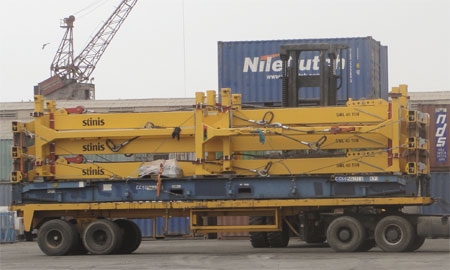From an economic standpoint, one of the sectors in most urgent need of attention has been the transportation infrastructure, since imports are crucial to rebuild the nation. Supplies such as building materials, food and medical supplies, among others, must somehow reach every corner of the country, whether they arrive by land, sea or air. And of course, the quicker and sooner, the better.
Angola’s once effective rail system comprises three main lines: the Benguela, Luanda and Namibe railways, all of which strategically connect with important seaports yet were greatly damaged during the war. However, projects are under way to restore the rails, bridges and stations as well as purchase new rolling stock, and once finished will reopen a valuable channel of distribution of goods and people.
The Benguela line, the longest railway on the continent, has its western terminus at Lobito, the country’s second largest port. The government expects the port to recover its former importance for the Angola-Zambia-DRC corridor once reconstruction of the Benguela Railway line is completed in mid-2012. The Port of Lobito is also undergoing a transformation; it will house larger docks, a new dry port, new container terminals, and support infrastructure for the petroleum and mining industries.
TRANSPORTATION INFRASTRUCTURE IS ONE OF THE SECTORS IN MOST URGENT NEED OF ATTENTION
AS A PUBLIC COMPANY, UNICARGAS ‘HAS BEEN INCENTIVIZING THE PRIVATE SECTOR TO PROVIDE A QUALITY SERVICE INTERNALLY’
UNICARGAS’ WORK IS VITAL TO ANGOLA’S RECONSTRUCTION: ALMOST 90% OF THE RESOURCES USED FOR REBUILDING THE NATION ARE IMPORTED
NEW INVESTMENT AND PARTNERSHIPS WITH FOREIGN EXPERTS ARE SOUGHT TO DEVELOP AN ENHANCED NATIONAL TRANSPORTATION NETWORK
|
Further south, the Port of Namibe was primarily a small fishing port until the discovery of iron ore at Kassinga. Today Angola’s third-largest port, Namibe mostly handles manufactured goods, food, materials and equipment for the marble and granite industries. The first phase of an expansion project, financed by the government of Japan, began in August last year. Meanwhile, China, is supporting the rehabilitation of the Moçamedes Railway, which stretches from Namibe’s port to Menongue, and is expected to be up and running sometime later this year.
One of the challenges Angolan ports currently face is keeping up with the sheer volume of imports arriving every day. Working to ensure the smooth flow of traffic and reduced waiting times for ships at the port is
Unicargas, a financially autonomous state-owned company. Created in 1988 by the Ministry of Transport to focus on international cargo transport, Unicargas has since grown to include concessions in cargo loading and dispatch, shipping, warehousing and services, as well as the representation of operators, consignees and transit routes. At the
Port of Luanda, the company was granted a 20-year concession beginning in 2005 to manage the multipurpose terminal, which boasts four docking stations, two warehouses, and a total area of nearly 2 million square feet.
Besides its invaluable work at the port, Unicargas is recognized as one of the largest companies in Angola in the field of road cargo transportation – with a fleet of 120 trucks – and leader in providing door-to-door logistical and freight forwarding services that include the handling of documentation not only in the company’s own terminal at Luanda, but at other ports, airports and inland depots, as well.
As Unicargas’ offering of services has grown, so has its geographic scope and consequently, the company is working to set up new logistical hubs. According to Abel Cosme, managing director of Unicargas and former commercial manager of the Port of Luanda, these new centers will be located in Benguela, which will serve the central area of the country; in Santa Clara (in Cunene province), which lies at the border with Namibia and is an important point of entrance for a huge flood of commodities originating in Johannesburg and Walvis Bay Port; and a third one in Malange, to serve eastern Angola.
“It’s important to highlight that Unicargas is open to establish partnerships with any interested company. We’ve received support for setting up strategic logistics hubs in the country that will for sure facilitate the distribution process of goods throughout the different regions of the country,” he says. “Unicargas as a public company has been incentivizing the private sector to provide a quality service internally.”
Mr. Cosme hopes that by offering high-quality services at competitive prices, the company can drive down the costs of cargo transport, which are unusually high due mainly to lack of competition.
“We wish to develop an economy of scale in which the increase of volume and intense rotation of cargo transport increase the revenues and at the same time consolidate the market shares always based on the service quality towards the client,” he says.
Unicargas’ work is vital to Angola’s reconstruction process: nearly 90% of the resources used for rebuilding the nation are imported, and long delays at ports due to limited infrastructure has hampered development. Consequentially, Unicargas seeks new investment and partnerships with foreign experts in order to develop an enhanced national transportation network.

0 COMMENTS